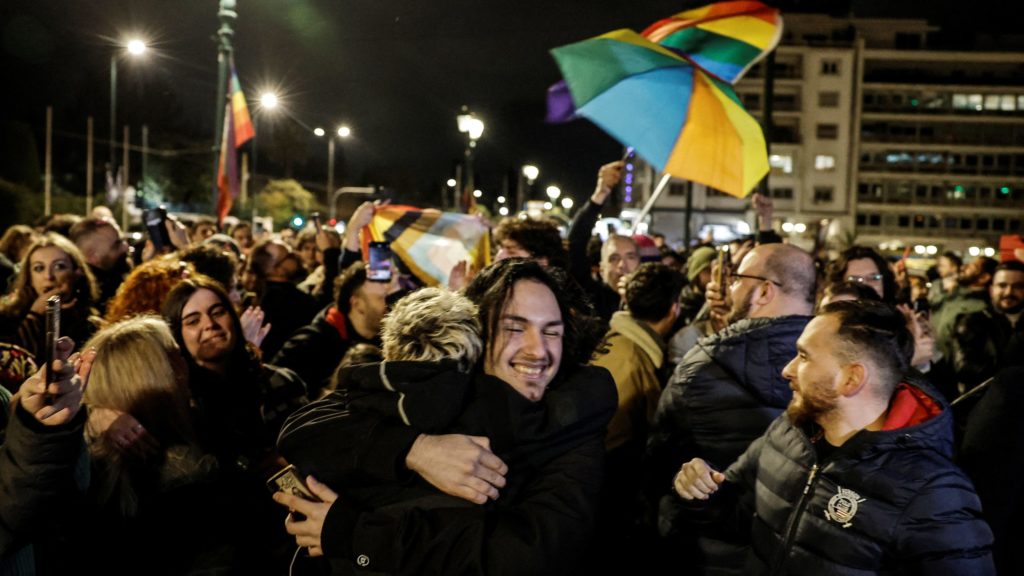Greece's minority Catholic Church has deplored a parliamentary vote to allow same-sex marriage and child adoption, the first in a predominantly Orthodox country.
"Our reaction is clear -- the church doesn't accept same-sex marriage, and we're surprised the government pressed ahead so quicky with this measure," said Archbishop Josif Printezis of Naxos, Andros, Tinos and Mykonos, secretary-general of Greece's Catholic bishops' conference.
"I don't know whether there was some great demand from people in metropolitan Athens. But those living elsewhere in Greece aren't comfortable with it, and it will cause us a lot of problems when it comes to baptisms and access to sacraments," he said.
The archbishop spoke as the first same-sex weddings were conducted following Feb. 15 approval of the bill sponsored by Prime Minister Kyriakos Mitsotakis' center-right government, which was signed into law a day later by President Katerina Sakellaropoulou.
In an OSV News interview, the archbishop said the Mitsotakis government had previously supported Christian teaching and maintained good ties with Greece's predominant Orthodox church, which vigorously opposed the legislation, but was widely believed to have been pressured by the European Union to introduce the reform.
He added that he and other bishops would advise Catholic parishes how to deal with same-sex couples, but would resist demands to endorse "marriage equality."
"Catholics believe in equality -- in our church too, some argue that everyone should have equal rights to a partner and family," Archbishop Printezis told OSV News. "But for now this is all in the realm of theory. When it comes to practicalities, I don't know whether Catholics will be so accepting of same-sex couples seeking to play a part in church liturgies."
Legislation to redefine marriage as the union of "two persons of the same or different sex" was announced by Mitsotakis after his New Democracy party was re-elected in June 2023, and tabled in February in the Hellenic Parliament, with backing from left-wing MPs.
The measure, an amendment to the Civil Code, was backed by 52% of Greeks in a December 2023 Pulse poll for the Skai media group, with 33% against and 15% undecided or indifferent, although same-sex adoption was supported by just 42%, with 47% opposed.
In a Jan. 12 declaration, Greece's Catholic bishops said "changing the definition of marriage and family" would "affect all Greek society," and they rejected claims by pro-change campaigners that marriage was "simply a legal construct."
"This proposal is a setback to our legal culture, to morals and culture in general -- it marks a point of decline for Greek society," the bishops said.
Meanwhile, the Orthodox church of Greece, which claims the spiritual loyalty of most of the population of 10.3 million, "categorically rejected" the legal change in a Jan. 30 open letter to MPs as "a deviation from Christian marriage and the established framework of the traditional Greek family.
"Existing rights for same-sex couples in Greece are adequately addressed through civil unions -- there is no constitutional or international obligation to establish same-sex marriage and parenting," the church's governing Holy Synod told legislators.
"The repercussions of this legislation, far from abstract, will affect Greek society's fundamental wellbeing, transforming parents from traditional fathers and mothers into neutral guardians, and prioritizing the rights of homosexual adults over the interests of future children," Orthodox leaders added.
Approval of the bill by 176 votes to 76 after a heated two-day debate in the 300-seat Athens parliament was welcomed by gay rights groups and by the government leader Mitsotakis, who said in a Feb. 15 social media post it marked "a milestone for human rights" and reflected "today's Greece: a progressive, democratic country, committed to European values."
However, the reform was opposed by member of the prime minister's governing party, and protested at Orthodox demonstrations in Athens and other cities, include a pre-vote prayer rally in the capital's Syntagma Square on Feb. 12, led by Greece's Orthodox presiding archbishop, Ieronymos II, who warned it would place supporters "outside the church."
The vote makes Greece the 16th of the European Union's 27 member-states to allow same-sex marriage and the 37th worldwide, as well as the first of Europe's 10 traditionally Orthodox countries to enable the practice.
In his OSV News interview, Archbishop Printezis said the decision of MPs to defy the predominant Orthodox church suggested the church's influence was waning in Greece, but added that Orthodox leaders could still pressure local government bodies not to allow same-sex marriages.
He added that joint opposition to the new law had brought the Catholic and Orthodox churches together, but said he doubted cooperation would extend into other areas.
"When the discussions about this legislation started, the Orthodox church urged us to stand with them -- and we did," the Catholic bishops' conference secretary general told OSV News.
"Meanwhile, some Orthodox priests and bishops have also applauded our church's statements, with many prominent figures also praising their pastoral clarity. But while we hope this could signal an opening in the curtain, some Orthodox leaders hold strict views against ecumenical cooperation," he added.

